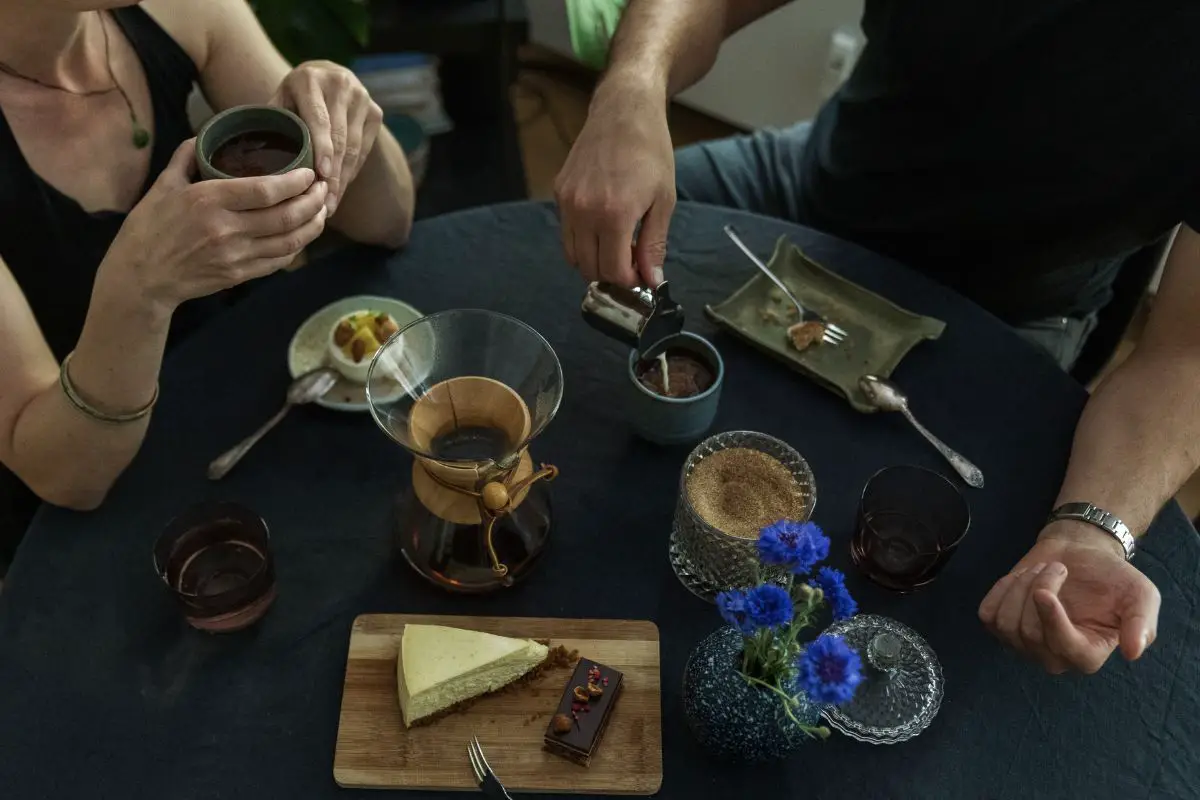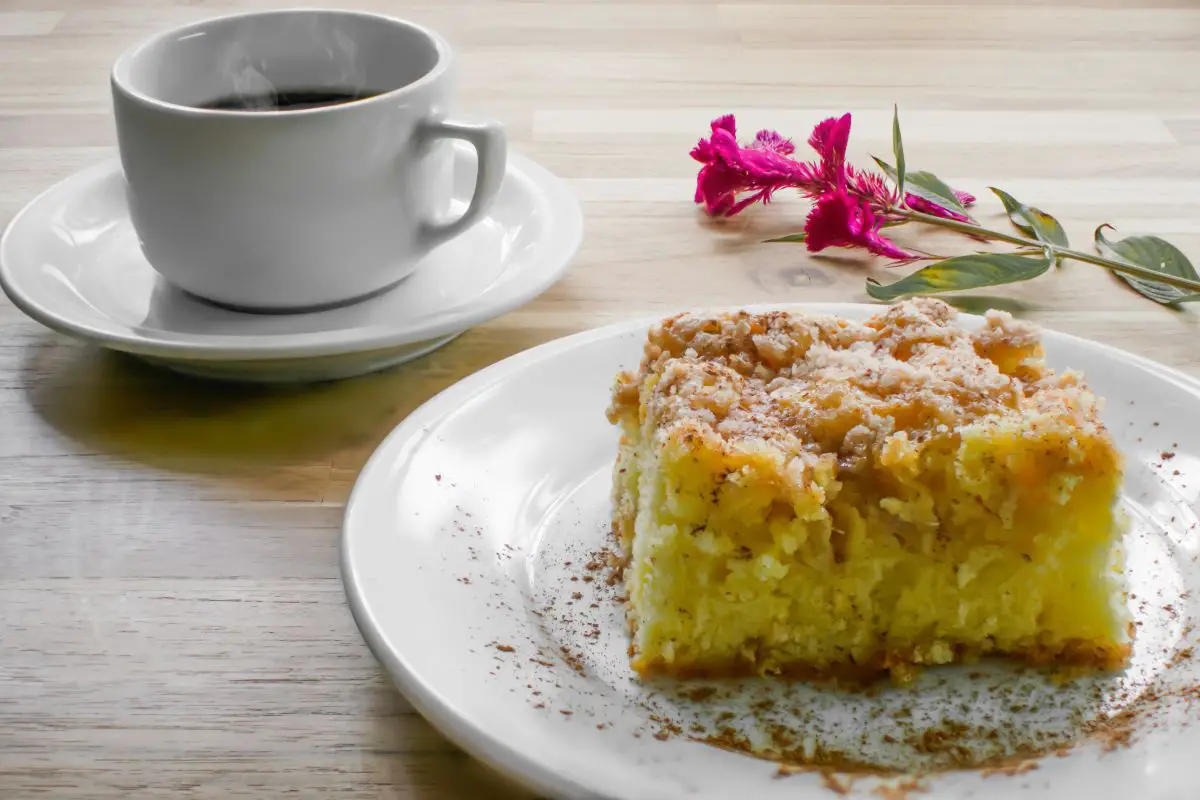German coffee is renowned for its unique qualities and exceptional taste. In this article, we will delve into the intricacies of German coffee and explore what sets it apart from other coffee varieties. With a focus on the art of brewing, meticulous attention to water temperature and brewing time, and a reputation for excellence, German coffee offers a one-of-a-kind experience that coffee enthusiasts around the world can appreciate.

One of the key factors that distinguishes German coffee is the art of brewing, which involves the use of Kaffeefilter and slow steeping. The Kaffeefilter, or coffee filter, is a vital component in the brewing process, allowing for the extraction of the coffee’s rich flavors while keeping any undesirable elements at bay. This method ensures a clean and pure cup of coffee, free from any sediment or bitterness.
Additionally, German coffee aficionados take their time when brewing, allowing the coffee to steep slowly and extract the full depth of flavors. This patience and attention to detail result in a cup of coffee that is both flavorful and well-balanced.
By adhering to strict standards of water temperature and brewing time, German coffee achieves a level of precision that is unmatched. The water used for brewing is carefully heated to a specific temperature, ensuring optimal extraction of the coffee’s flavors. Similarly, the brewing time is meticulously monitored, allowing for the perfect balance between extracting the desired flavors and avoiding any bitterness or over-extraction. This level of precision may seem meticulous, but it is a testament to the commitment of German coffee artisans to deliver a consistently high-quality product.
The result is a cup of coffee that is rich, smooth, and satisfying, providing a delightful sensory experience for coffee enthusiasts. German coffee’s reputation for excellence is well-deserved, as it embodies the perfect fusion of traditional methods honed over centuries and a passion for crafting the finest coffee possible.
Key Takeaways
- German coffee is renowned for its unique qualities and exceptional taste, achieved through meticulous attention to water temperature and brewing time.
- The use of Kaffeefilter and slow steeping in German coffee brewing enhances the flavor profile, allowing for the extraction of rich flavors while keeping undesirable elements at bay.
- Consistency in water temperature and brewing time is valued in German coffee brewing, achieved through the use of precision instruments like thermometers and timers.
- German coffee has a rich and smooth flavor profile with notes of chocolate, caramel, nuts, and a velvety smooth texture.
The Art of Brewing: The Importance of Kaffeefilter and Slow Steeping
The use of kaffeefilter and slow steeping in German coffee brewing techniques is a testament to the meticulous attention paid to the art of extracting the fullest flavors from the beans. German coffee culture places great importance on the quality of the coffee and the brewing process itself.
The kaffeefilter, or coffee filter, is a key tool in this process. It is typically made of paper or cloth and is used to separate the coffee grounds from the liquid, resulting in a smoother and cleaner cup of coffee. This method allows for precise control over the extraction process, ensuring that only the best flavors are extracted from the beans.
Slow steeping, also known as the ‘German way’ of brewing coffee, further enhances the flavor profile of German coffee. This method involves pouring hot water over the coffee grounds and allowing them to steep for an extended period of time. The slow and gradual extraction process ensures that the flavors are fully extracted from the beans, resulting in a rich and robust cup of coffee. This technique also allows for the release of more aromatic compounds, adding depth and complexity to the flavor profile.
In German coffee brewing, meticulous attention is paid to the water temperature and brewing time. The water temperature is carefully monitored to ensure that it is within the optimal range for extracting the flavors from the beans. Generally, the water is heated to around 195-205 degrees Fahrenheit (90-96 degrees Celsius), as this temperature range allows for proper extraction without over-extracting or scorching the coffee. Additionally, the brewing time is carefully controlled to achieve the desired strength and flavor. This attention to detail ensures that each cup of German coffee is brewed to perfection, resulting in a consistently high-quality and flavorful experience for the coffee drinker.
Transitioning to the subsequent section, the meticulous water temperature and brewing time, along with the use of kaffeefilter and slow steeping, are just a few examples of the careful and precise techniques employed in German coffee brewing. These methods contribute to the rich and nuanced flavors that German coffee is known for, creating a truly exceptional coffee experience.
Meticulous Water Temperature and Brewing Time
One notable characteristic of coffee in Germany is its emphasis on precise water temperature and brewing duration, ensuring optimal flavor extraction. German coffee enthusiasts understand that the water temperature plays a crucial role in the taste of the final brew. To achieve the perfect cup of coffee, they meticulously measure the water temperature and ensure it stays between 195 and 205 degrees Fahrenheit. This range is believed to provide the ideal balance between extracting the flavors from the coffee beans and avoiding any bitter or burnt taste.
Additionally, Germans pay close attention to the brewing duration. They generally prefer longer brewing times, allowing the coffee to steep slowly and fully release its flavors into the water.
To further highlight the meticulous approach to brewing coffee in Germany, here are four specific aspects that are closely observed:
- Water Temperature: The temperature of the water is carefully controlled to achieve optimal extraction. Using water that is too hot can result in a bitter taste, while water that is too cold may not fully extract the flavors. By maintaining the water temperature within the recommended range, German coffee enthusiasts ensure a balanced and flavorful cup of coffee.
- Brewing Time: Germans believe that allowing the coffee to steep for an extended period enhances the flavor profile. The longer brewing time allows for a more thorough extraction of the coffee’s oils and compounds, resulting in a richer and more complex taste. This patient approach to brewing is a testament to the dedication and passion for coffee that is prevalent in German culture.
- Consistency: Germans value consistency in their coffee brewing process. They understand that replicating the same water temperature and brewing time each time they make coffee is crucial for achieving a consistently excellent cup. This attention to detail ensures that coffee lovers in Germany can enjoy a reliably high-quality cup of coffee every time.
- Precision Instruments: German coffee enthusiasts often rely on precision instruments, such as thermometers and timers, to monitor the water temperature and brewing time accurately. This commitment to precision reflects the meticulous nature of German culture and their dedication to achieving the best possible coffee experience.
By focusing on precise water temperature and brewing duration, German coffee brewing techniques result in a rich and smooth flavor profile. The careful attention to detail ensures that every cup of coffee is a delightful and satisfying experience.
Next, we will explore how this meticulous brewing process contributes to the unique taste characteristics of German coffee.
Rich and Smooth Flavor Profile
Notably, German coffee brewing techniques result in a flavor profile that is both rich and smooth, captivating the palate with its nuanced complexities.
German coffee is known for its exceptional taste, which is achieved through a combination of factors, including the quality of the beans, the roasting process, and the brewing method.
German coffee beans are carefully selected from regions known for producing high-quality coffee, ensuring that only the finest beans are used. These beans are then expertly roasted to bring out their full flavor potential, resulting in a rich and aromatic brew.
The brewing process itself is also key to the rich and smooth flavor profile of German coffee. German coffee makers pay meticulous attention to detail, ensuring that every step of the brewing process is carried out with precision.
This includes carefully measuring the coffee grounds and water to achieve the perfect ratio, as well as controlling the water temperature and brewing time. The water temperature is crucial, as it affects the extraction of flavors from the coffee grounds. German coffee makers typically use water that is just below boiling point, which allows for optimal extraction without scorching the coffee.
Additionally, the brewing time is carefully monitored to ensure that the coffee is neither under-extracted nor over-extracted, resulting in a balanced and flavorful cup.
The result of these meticulous brewing techniques is a coffee with a rich and smooth flavor profile that is highly enjoyable to drink. The coffee has a depth of flavor that is both complex and harmonious, with notes of chocolate, caramel, and nuts, as well as a velvety smooth texture.
Each sip is a sensory delight, with the flavors lingering on the palate long after the last drop has been consumed.
This attention to detail and commitment to quality is what sets German coffee apart and contributes to its reputation for excellence.
Transition: As we delve further into the world of German coffee, it is important to explore its reputation for excellence, which is deeply rooted in the country’s long-standing coffee culture.
German Coffee’s Reputation for Excellence

Renowned for its mastery in the art of brewing, German coffee stands as a shining star in the realm of liquid poetry. Its reputation for excellence can be attributed to a combination of factors that contribute to its unique flavor profile. To truly understand the essence of German coffee, one must delve into the intricacies of its brewing process, the quality of its beans, and the cultural significance it holds for the German people.
First and foremost, German coffee is known for its exceptional brewing process. The Germans take great pride in their meticulous attention to detail, ensuring that every cup of coffee is brewed to perfection. From the precise grind size to the water temperature and brewing time, every step is carefully executed to extract the optimal flavors from the beans. This commitment to precision results in a cup of coffee that is rich, smooth, and balanced.
Secondly, the quality of the beans used in German coffee is of utmost importance. Germany has a long history of importing high-quality coffee beans from various regions around the world. These beans are often sourced from countries known for their coffee production, such as Brazil, Colombia, and Ethiopia. The German coffee industry places a strong emphasis on sustainability and fair trade, ensuring that the beans used are ethically sourced and of the highest quality.
Additionally, German coffee is deeply ingrained in the country’s culture, making it more than just a beverage. It is a symbol of hospitality, tradition, and community. Germans take their coffee rituals seriously, with coffee breaks being a common occurrence throughout the day. Coffeehouses, known as ‘Kaffeehäuser,’are an integral part of German social life, providing a space for people to gather, relax, and enjoy a cup of coffee. This cultural significance further enhances the reputation of German coffee as a mark of excellence.
German coffee’s reputation for excellence is well-deserved. Its mastery in the art of brewing, the use of high-quality beans, and the cultural significance it holds all contribute to its unique flavor profile. By understanding the intricacies of German coffee, one can truly appreciate the dedication and craftsmanship that goes into each cup.
Transitioning into the subsequent section, the traditional methods perfected over centuries have played a crucial role in shaping German coffee’s exceptional reputation.
Traditional Methods Perfected Over Centuries
The time-honored techniques honed through generations have been instrumental in shaping the exceptional reputation of German coffee. German coffee culture is deeply rooted in tradition and craftsmanship, with a focus on quality and precision. From the sourcing of the beans to the brewing process, every step is meticulously executed to ensure a superior cup of coffee.
One key aspect of German coffee production is the emphasis on using only the finest beans. German coffee roasters are known for their meticulous attention to detail when selecting beans from around the world. They carefully consider factors such as origin, altitude, and harvesting methods to ensure the highest quality. This commitment to sourcing the best beans contributes to the rich and distinctive flavors that German coffee is renowned for.
Another important aspect of German coffee tradition is the art of brewing. German coffee makers have perfected their brewing techniques over centuries, resulting in a unique and flavorful cup of coffee. One popular brewing method in Germany is the ‘pour-over’ method, where hot water is slowly poured over a filter containing freshly ground coffee. This method allows for maximum extraction of flavors and aromas, resulting in a well-balanced and flavorful brew.
Embarking on a journey to discover the nuances of German coffee is a captivating experience. From the carefully selected beans to the meticulous brewing process, every aspect of German coffee production is aimed at creating a superior cup of coffee. Whether you prefer a strong and bold espresso or a delicate and aromatic filter coffee, German coffee offers a wide range of flavors to satisfy every palate.
Embarking on a Journey to Discover the Nuances of German Coffee

Embarking on an exploration of the intricacies of German coffee unveils an array of flavors and brewing techniques that captivate the senses.
German coffee is known for its rich and robust flavors, which are often achieved through the use of high-quality beans and a meticulous brewing process.
The Germans take great pride in their coffee culture, with a strong emphasis on quality and tradition.
To truly appreciate German coffee, one must understand the importance of the beans themselves. German coffee is typically made using Arabica beans, which are known for their smooth and nuanced flavors. These beans are often roasted to perfection, resulting in a rich and full-bodied taste. Additionally, German coffee often incorporates a variety of specialty beans, such as Ethiopian or Brazilian, to add depth and complexity to the final brew.
When it comes to brewing techniques, Germans have perfected the art of coffee preparation over centuries.
One popular method is the use of a French press, which allows for the extraction of the coffee’s natural oils and flavors.
Another traditional method is the use of a Moka pot, which produces a strong and concentrated brew.
Germans also appreciate the simplicity of filter coffee, where hot water is poured over ground coffee beans, resulting in a clean and balanced cup of joe.
The journey to discover the nuances of German coffee is a rewarding experience for coffee enthusiasts.
From the selection of high-quality beans to the meticulous brewing techniques, German coffee offers a rich and flavorful experience.
Whether enjoyed in a cozy café or brewed at home, German coffee captivates the senses and provides a sense of comfort and safety.
So, take a sip and immerse yourself in the world of German coffee.
Frequently Asked Questions
What are the most popular coffee beans used in German coffee brewing?
German coffee is known for its use of high-quality Arabica beans, which are carefully roasted to bring out a rich and balanced flavor. Popular varieties include Colombian, Ethiopian, and Brazilian beans, offering a diverse range of taste profiles to satisfy coffee enthusiasts.
Are there any specific techniques or rituals associated with drinking German coffee?
There are specific techniques associated with drinking German coffee. One popular ritual is the “Kaffeeklatsch,”where friends gather for coffee, cake, and conversation. Another tradition is adding a small amount of whipped cream or a liquor to the coffee.
How does German coffee differ from other European coffee traditions?
German coffee differs from other European coffee traditions in its emphasis on quality and craftsmanship. The brewing methods, such as the use of a French press or filter coffee, result in a rich and robust flavor profile that is distinctively German.
Are there any regional variations in German coffee brewing methods?
Regional variations in German coffee brewing methods exist, reflecting the country’s diverse cultural and geographical influences. These variations range from the strong and rich East Frisian tradition to the milder and creamier Bavarian style, providing a unique coffee experience across Germany.
What is the history and cultural significance of coffee in Germany?
The history of coffee in Germany dates back to the 17th century, when it was introduced by merchants. Over time, coffee has become deeply ingrained in German culture, with coffeehouses playing a significant role as social gathering places.
Conclusion
In conclusion, German coffee stands out due to its unique brewing methods, meticulous attention to detail, and rich flavor profile. The use of Kaffeefilter and slow steeping process allows for the extraction of the coffee’s full flavors, resulting in a smoother and more refined cup of coffee.
The careful control of water temperature and brewing time further enhances the taste and aroma of German coffee.
One example of the excellence of German coffee can be seen in the case study of a small family-owned coffee shop in Berlin. This shop has been using traditional German brewing methods for generations, and has gained a reputation for serving some of the best coffee in the city. Customers travel from far and wide to experience the rich and smooth flavors that can only be found in German coffee. This case study highlights the long-standing tradition and commitment to quality that is inherent in German coffee culture.
In conclusion, German coffee is a true art form that has been perfected over centuries. Its unique brewing methods, attention to detail, and commitment to excellence result in a cup of coffee that is rich, smooth, and full of flavor. Whether enjoying a cup in a traditional German coffee shop or brewing it at home, the nuances of German coffee are sure to delight even the most discerning coffee connoisseurs.
Related articles: